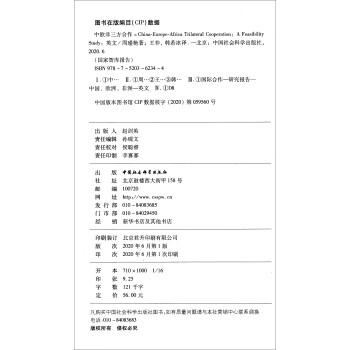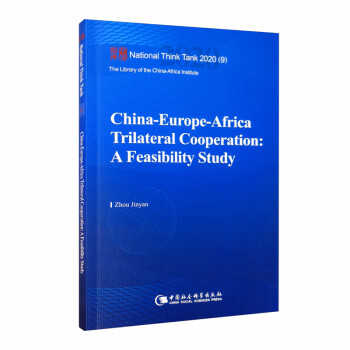精彩书摘:
《中欧非三方合作(英文版)》:
2.3 The Challenges of New South-South Cooperation and the Need for Trilateral Cooperation
Compared with North-South cooperation, New South-South cooperation has its own unique advantages, but it also faces the challenges of building its own development knowledge and experience from the perspective of the South, promoting the transfer of parallel experience among the South countries, and coordinating South-South cooperation and North-South cooperation relations. How to innovate the mode of South-South cooperation, provide more public goods for global governance, provide new ideas and solutions for global problems, and actively shape the international cooperation system has become a new mission of South-South cooperation. Trilateral Cooperation has become a powerful way for new South-South cooperation to meet challenges.
2.3.1 Advantages of South-South Cooperation
The traditional South-South cooperation is mainly limited to economic and trade cooperation. The areas of new South-South cooperation include not only economic cooperation, but also extensive exchanges between development knowledge and experience on regional governance and state governance, highlighting South-South cooperation, and generating new ideas for developing countries to work together to address the challenges of development.
First, mutual learning between South countries is often more effective than one-way knowledge transfer from the North to the South. Different from the top-down knowledge transfer path of cooperation between North and South, South-South cooperation practices a development partnership model of equality and mutual learning. The sharing of knowledge and experience between South-South cooperation is not based on the premise that a country's experience is more advanced than that of another country, but rather that developing countries should seek innovative solutions to development problems through mutual learning and cooperation. At the same time, South-South technical cooperation tends to use capacity development as a process rather than a "product", in which capacity development is embedded as a tool for mutual learning.
Second, due to the similar historical background and common development challenges, the exchange of development concepts and ideas between South countries are more meaningful. Emerging economies accumulated a lot of experience in poverty reduction and development. Although the development experience cannot be replicated directly due to different historical experience, development basis and national conditions, the development ideas of emerging economies such as China are worth the reference of the Southern countries. Taking the city Shenzhen of China as an example, at the beginning of reform and opening up, some people also worried about whether the Shenzhen Special Administrative Region would become a colony and whether the development of a market economy would lead to the restoration of capitalism. However, the reformers in Shenzhen were courageous to break the fixed thinking, wade across the stream by feeling the way, and finally achieved brilliant results. In addition to special economic zones, industrial parks and other specific experiences, China's liberation thought, independent exploration in line with her own national conditions of the way of development is more worthy of reference by other developing countries.
……
作者简介:
Zhou Jinyan,Assistant Research Professor at the Institute of West Asian and African Studies (IWAAS), Chinese Academy of Social Sciences (CASS). She holds a PhD in international relations from the Graduate School of Chinese Academy of Social Sciences, a M.A. degree of Peace and Security from Institute of Peace and Security Studies, Hamburg University and a Bachelor degree in Law from Tongji University (Shanghai). During her PhD study, she researches in depth the comparison of Chinese and European development cooperation with Africa Previous appointments include program manager at Heinrich Boell Stiftung and political analyst at the European Union Delegation to China During this time she intensively engaged in policy dialogues between European and Chinese governments, think tanks and universities.
Her recent work involves development studies, developmental state in Africa, development-security nexus, China's aid and investment in African, trilateral cooperation and African industrialization. She has conducted field trip in Angola and Etluopia and carried out professional travel in India, Pakistan, Malaysia, Kenya, Senegal, South Africa, Morocco, UK, Germany and the United States. She has been invited to present at different international conferences and has fulfilled research projects for the World Bank, DFID, BRICS Policy Center, SAIS-CARI and Chinese government institutions. She is also an alumni of MGG/DIE Germany, ZEIT-Stiftung Ebelin and Gerd Bucerius and India Observer Research Foundation.
内容简介:
The trilateral cooperation, an innovative model of development cooperation serves as a bridge for North-South Cooperation and South-South Cooperation. The trilateral cooperation was initially raised by European donor countries after 2006 Forum on China-Africa Cooperation(FOCAC) Beijing summit, with the intention to integrate China into the West-dominated international cooperation system. China has been compelled to react passively to these requests. With the changing international situation, especially after 2014, the policy space for China to pursue trilateral cooperation has been changed dramatically. China's attitude towards trilateral cooperation has been transformed from passive response to positive action. An example is that China has taken its own initiative to propose the third-party market cooperation. With China's growing self-confidence at the international stage, the trilateral cooperation among China, Europe and Africa is facing new opportunities. The trilateral cooperation, which has experienced ups and downs at government and policy level, now comes again to the list of policy makers. Facing the counter-globalization trend and global uncertainties mainly caused by the U.S., the trilateral cooperation among China, Europe and Africa has a significant role in balancing the China-U.S. relationship and Europe-U.S. relationship.
目录:
Chapter 1 New Opportunities for China-EU-Africa Cooperation
1.1 Changes in the International Situation Concerning Trilateral Cooperation in Africa
1.2 From Passive to Active: China's Changing Attitude Towards the Development of Africa-related Trilateral Cooperation
1.3 Debates on Trilateral Cooperation in Europe Context
Chapter 2 Trilateral Cooperation: A Bridge Between North-South Cooperation and South-South Cooperation
2.1 New Changes in the International Cooperation System
2.2 South-South Cooperation under the Changing International Cooperation System
2.3 The Challenges of New South-South Cooperation and the Need for Trilateral Cooperation
Chapter 3 Necessity and Feasibility of the Trilateral Cooperation among China, Europe and Africa
3.1 China's Policy Towards Africa
3.2 EU Policy Towards Africa
3.3 The Necessity of Strengthening Cooperation between China and Europe in African Affairs
3.4 The Feasibility of Strengthening Cooperation between China and Europe in African Affairs
Chapter 4 Principles and Key Areas of Trilateral Cooperation Between China, Africa and Europe
4.1 Strengthen Cooperation in the Field of Agriculture
4.2 Strengthen Cooperation in the Field of Health Care
4.3 Carry Out Production Capacity Cooperation between China, Europe and Africa
4.4 Strengthen Cooperation in Vocational Training for African Youth
4.5 Enhancing Dialogues on the Maintenance of Peace and Security in Africa
4.6 Take Agriculture and Medical Care as the Starting Point to Advance Trilateral Cooperation
……
Chapter 5 Case Study on Trilateral Cooperation among China, Europe and Africa-China-UK Cooperation in Peace and Security in Africa
Chapter 6 Case Study on China-Europe-Africa Cooperation: China-Germany-Ethiopia Cooperation on TVET
Chapter 7 Case Study of Trilateral Health Cooperation among China, Europe and Africa
Chapter 8 Policy Suggestions
References




好评度